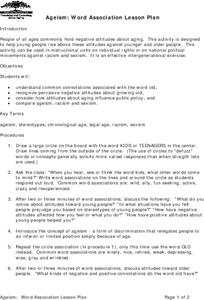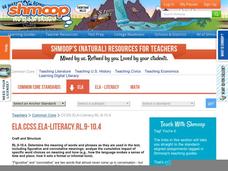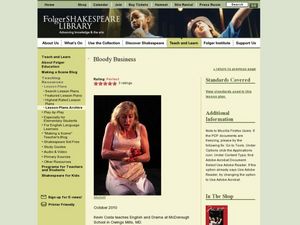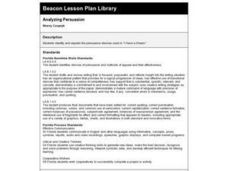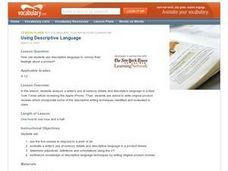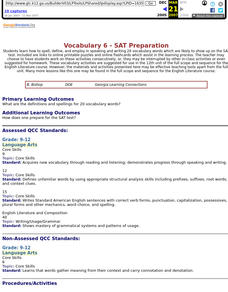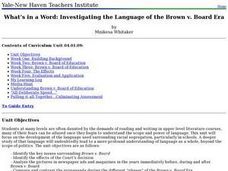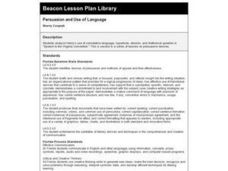Curated OER
"Words, words, words"
Students discuss words that represent the "big ideas" in Othello and that recur throughout the play. They will be assigned words to track throughout the text, recording which character says the word and in what context.
Curated OER
Ageism: Word Association Lesson Plan
Students discuss the attitudes related to the word old. In groups, they identify negative stereotypes about getting older and determine how these attitudes affect public policy on the elderly. They compare and contrast the concepts of...
Curated OER
The Power of Words
Students research the power of words and the necessary teaching of tolerance. In groups, they research a particular word given to them about a group in society. They trace the origin of the word and form a stance on how they view the...
Prestwick House
"Because I could not stop for Death" -- Visualizing Meaning and Tone
Emily Dickinson's "Because I could not stop for Death" provides high schoolers with an opportunity to practice their critical thinking skills. They examine the images, diction, rhythm, and rhyme scheme the poet uses and consider how...
EngageNY
Analyzing Text Structure: “Water Is Life” Paragraphs
Water, water everywhere. Readers revisit paragraphs six through nine in the article "Water is Life" to answer text-dependent questions. They then pair up to reread the article focusing on its structure and record their thoughts on...
Curated OER
History of the Star Spangled Banner
We have all heard the "Star Spangled Banner" at many points in our lives, but how often do we take the time to truly understand what the words of the national anthem mean to Americans? Don't miss this opportunity to examine the lyrics...
Curated OER
A Gesture Is Worth a Thousand Words
Students share observations on the nuances of meaning in face to face and online interactions with others. After reading an article, they identify the causes and effects of internet flaming. They create their own comic strips...
Curated OER
What Do You Call Older People?
Students brainstorm a list of words they use to refer to the elderly. As a class, they discuss the importance of word connotations and explain those used to refer to the older population. They complete a handout and share their thoughts...
National Endowment for the Humanities
Dostoevsky's Crime and Punishment
Pain and suffering do not have to be inevitable in a study of Crime and Punishment. A carefully scaffolded lesson plan introduces readers to the divided natures of the characters in Fyodor Dostoevsky's complex novel. Groups use the...
Shmoop
ELA.CCSS.ELA-Literacy.RL.9-10.4
The fourth standard for reading literature in the Common Core calls for young readers to be able to determine the figurative and connotative meanings of words and phrases. Use this resource, a continuation of a series of Common Core...
Southern Nevada Regional Professional Development Program
Close Reading in the Classroom
Close reading is key to the analysis and interpretation of literature. A close reading of the title and the epigraph of “The Love Song of J. Alfred Prufrock” offers readers an opportunity to examine how even single words or names can...
Curated OER
A Modest Proposal: Irony Made Understandable with Rock and Roll
Who doesn't love music? Poems and songs will engage your high school class in a discussion about irony. Use songs like "Rockin' in the Free World" or "Born in the U.S.A." to illustrate the ironic point of view. Print the lyrics so...
Curated OER
Bloody Business
Students research word frequencies in Macbeth and create a frozen picture inspired by a word. In this Macbeth lesson, students view Blood Will Have Blood and discuss the dual meaning of the word "blood." Students identify five major...
Curated OER
Where Math Meets Poetry
Young scholars identify Fibonacci's sequence of numbers and use the pattern to write poetry with one syllable words. In this math and writing lesson plan, students identify Fibonacci's sequence of numbers and learn about this early...
Curated OER
Collocation Pelmanism
Students read and analyze the article, "Lexical exploitation of texts," and become aware of the concept of recycling new words. They practice this concept several times in class before they take on the memory game pelmanism in the follow...
Curated OER
Close Reading
Eleventh graders read and study Hamlet. Then they are introduced to close reading as a means of understanding what is being read--not only understanding the printed word, but also the nuances and connotations of language as it is used by...
Curated OER
What's So Bad or Good About Conflict?
Learners of all ages discuss how conflict can be negative and positive. First, they create a class bulletin board about conflict, and provide their thoughts and connotations surrounding the word. In a class discussion, they ask questions...
Curated OER
Analyzing Persuasion
A reading of Dr. Martin Luther King Jr.'s "I Have a Dream" speech launches a study of rhetorical devices such as hyperbole, allusion, metaphor, simile, personification, connotative language and parallel structure. Class members then...
EngageNY
Forming a Research-Based Claim: Cascading Consequences Charts
Life is all about choices and consequences. Using a Cascading Consequences chart, scholars create a visual map of the effects of a particular choice or action related to water management. With their researcher's notebooks and copies of...
Curated OER
Using Descriptive Language
Students examine the use of adjectives in a product review, then write their own descriptive review. In this writing and word usage lesson, students first analyze the choice of adjectives in a New York Times article about the iPhone,...
Curated OER
Vocabulary 6 - SAT Preparation
Students discover how to spell, define, and employ in speaking and writing 20 vocabulary words which are likely to show up on the SAT test. Included are links to online printable puzzles and online flashcards.
Prestwick House
Teaching Shakespeare: Sonnet 73
It's that time of year to consider how Shakespeare selects his images and structures his Sonnet 73 to develop the meaning of the poem. Class members examine the rhyme scheme, the indented lines, the conceit, and the images used in each...
Curated OER
What's in a Word: Investigating the Language of the Brown v. Board Era
Students focus on the development of the language used surrounding racial segregation, particularly in schools. They identify the key issues surrounding Brown v. Board and identify the effects of the Court's decision. They analyze the...
Curated OER
Persuasion and Use of Language
Students discuss connotative language, hyperbole, allusion, and rhetorical question. In small groups, they read one section of the "Speech to the Virginia Convention" and analyze these devices. Groups present their results to the class.



